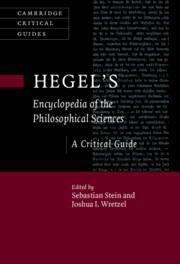Book contents
- Hegel’s Encyclopedia of the Philosophical Sciences
- Cambridge Critical Guides
- Hegel’s Encyclopedia of the Philosophical Sciences
- Copyright page
- Contents
- Contributors
- Introduction
- Chapter 1 Logical and Natural Life
- Chapter 2 Hegel’s Encyclopedia as the Science of Freedom
- Chapter 3 Essence in Hegel’s Encyclopedia and Science of Logic
- Chapter 4 The Concept’s Freedom
- Chapter 5 From Logic to Nature
- Chapter 6 Hegel’s Philosophy of Nature
- Chapter 7 Hegel’s Anthropology
- Chapter 8 Hegel’s Critique of Materialism
- Chapter 9 Hegel’s Psychology
- Chapter 10 Political Ontology and Rational Syllogistic in Hegel’s Objective Spirit
- Chapter 11 Taking the System Seriously
- Chapter 12 §§556–63: Art as a Form of Absolute Spirit
- Chapter 13 The Stubbornness of Nature in Art
- Chapter 14 The Encyclopedia’s Notion of Religion
- Chapter 15 Absolute Geist or Self-Loving God?
- Bibliography
- Index
- Cambridge Critical Guides
Chapter 4 - The Concept’s Freedom
Published online by Cambridge University Press: 07 August 2021
- Hegel’s Encyclopedia of the Philosophical Sciences
- Cambridge Critical Guides
- Hegel’s Encyclopedia of the Philosophical Sciences
- Copyright page
- Contents
- Contributors
- Introduction
- Chapter 1 Logical and Natural Life
- Chapter 2 Hegel’s Encyclopedia as the Science of Freedom
- Chapter 3 Essence in Hegel’s Encyclopedia and Science of Logic
- Chapter 4 The Concept’s Freedom
- Chapter 5 From Logic to Nature
- Chapter 6 Hegel’s Philosophy of Nature
- Chapter 7 Hegel’s Anthropology
- Chapter 8 Hegel’s Critique of Materialism
- Chapter 9 Hegel’s Psychology
- Chapter 10 Political Ontology and Rational Syllogistic in Hegel’s Objective Spirit
- Chapter 11 Taking the System Seriously
- Chapter 12 §§556–63: Art as a Form of Absolute Spirit
- Chapter 13 The Stubbornness of Nature in Art
- Chapter 14 The Encyclopedia’s Notion of Religion
- Chapter 15 Absolute Geist or Self-Loving God?
- Bibliography
- Index
- Cambridge Critical Guides
Summary
The logic of the Concept has three parts. The first (“The subjective concept”) examines (apparently following the divisions of traditional logic) the concept as-it-is, the types of judgement and the reasoning (“syllogism”) constructed from judgements; but the notions of judgement and syllogistic reasoning are as deeply transformed as that of the concept itself. Far from any formal approach, how thought informs reality should be examined. The second part (“The object”) examines how this conceptual shaping of the real happens. It occurs at three levels, seemingly corresponding to the great divisions of classical science: mechanism, chemism, teleology. The third part concerns “the idea”, a notion that is completely transformed, being defined as “the absolute unity of the [subjective] concept and objectivity” (Encyclopedia §213). Hegel describes how subjectivity and objectivity, thought and reality, interfere, to the extent that it becomes impossible to separate them, except at the cost of a great abstraction, that of the “understanding”. Hegel calls this interpenetration of thought and being the “absolute idea”, thus redefining the terms in which philosophy had hitherto been thought.
- Type
- Chapter
- Information
- Hegel's Encyclopedia of the Philosophical SciencesA Critical Guide, pp. 68 - 87Publisher: Cambridge University PressPrint publication year: 2021

